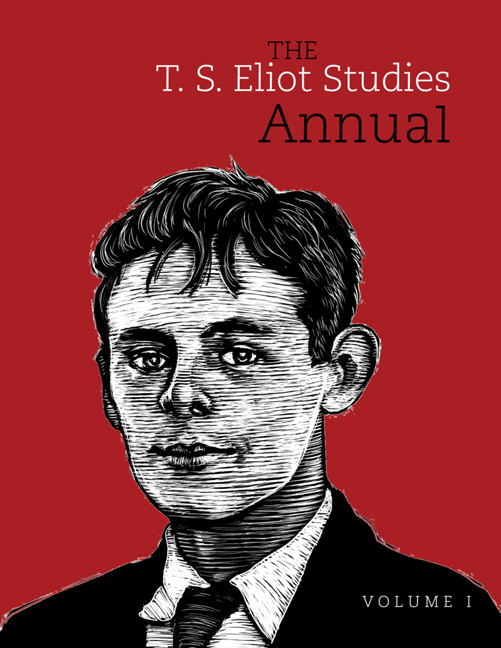Book contents
- Frontmatter
- Contents
- Abbreviations of Works
- General Editor's Note
- The Short and Surprisingly Private Life of King Bolo: Eliot's Bawdy Poems and Their Audiences
- Dull Tom-Tom's Absurd Prelude: Ludic Modernism in Early T. S. Eliot
- Eliot at Bergson's Lectures, 1910–1911
- The American Legacy of “Prufrock”
- Poetry (June 1915)
- The Stale Dregs of Revolt
- Prufrock, Belated
- Eliot's Allusive Legacy and Obscurity in “Prufrock”
- Transmuting F. H. Bradley: T. S. Eliot's Notes Towards a Theory of Poetry
- T. S. Eliot, Phenomenologist
- Astride the Dark Horse: T. S. Eliot and the Lloyds Bank Intelligence Department
- Aristophanic Structures in Sweeney Agonistes, “The Hollow Men,” and Murder in the Cathedral
- Eliot and Virgil in Love and War
- T. S. Eliot Bibliography 2014
- Notes on Contributors
Eliot's Allusive Legacy and Obscurity in “Prufrock”
- Frontmatter
- Contents
- Abbreviations of Works
- General Editor's Note
- The Short and Surprisingly Private Life of King Bolo: Eliot's Bawdy Poems and Their Audiences
- Dull Tom-Tom's Absurd Prelude: Ludic Modernism in Early T. S. Eliot
- Eliot at Bergson's Lectures, 1910–1911
- The American Legacy of “Prufrock”
- Poetry (June 1915)
- The Stale Dregs of Revolt
- Prufrock, Belated
- Eliot's Allusive Legacy and Obscurity in “Prufrock”
- Transmuting F. H. Bradley: T. S. Eliot's Notes Towards a Theory of Poetry
- T. S. Eliot, Phenomenologist
- Astride the Dark Horse: T. S. Eliot and the Lloyds Bank Intelligence Department
- Aristophanic Structures in Sweeney Agonistes, “The Hollow Men,” and Murder in the Cathedral
- Eliot and Virgil in Love and War
- T. S. Eliot Bibliography 2014
- Notes on Contributors
Summary
To me, the “revolution” and legacy of “The Love Song of J. Alfred Prufrock” lies in its unique use of the allusive method and the relative obscurity that purposefully accompanies them. It is the method that accompanies Eliot's theory of impersonality, a distancing and masking technique that begins in 1911 when the twenty-twoyear- old poet projected himself into a persona nearly twice his age for his dramatic monologue. When he was later asked whether Prufrock represented the modern age or if he was a character from The Waste Land, Eliot replied, “It was partly a dramatic creation of a man of about 40 I should say, and partly an expression of feeling of my own through this dim imaginary figure.” That distancing of the personal voice or “expression of feeling” continues into “Gerontion,” an older persona than Prufrock, and into the despondent narrator of allusive voices in The Waste Land, where the allusions are more plentiful, disconnected, and intentionally obscure, leading many readers to discern no personal voice and to read the poems as impersonal reflections on the modern age, its disillusioned sensibility, spiritual bankruptcy, and so on. But each allusion is selected not only for economy of poetic expression; each has some personal association and context for the poet who embeds something of his personal voice within; it is muted, but it is discernible to the scrutinizing reader through the pattern of allusions in the poem. Eliot said in various ways that the personal power of a poem can be felt before it is understood: I know that when I first encountered “Prufrock” as a sophomore it struck in me a previously unheard chord or unknown substrata of my immature being, and I have been trying to understand the poem and its effect ever since. Though Eliot upheld an impersonal theory for the poet in the creative process, as a critic, he was, ironically, always in search of the ways in which a poet's sensibility or vision of reality are evident in the allusive texture of the poem. Though there may be some concern with “the modern age” in “Prufrock,” “Gerontion,” and The Waste Land, I believe that they are deeply personal poems, deeply obscured. We have let the policing principles of the New Criticism keep us from such perceptions too long.
- Type
- Chapter
- Information
- The T. S. Eliot Studies Annual , pp. 93 - 98Publisher: Liverpool University PressPrint publication year: 2017



